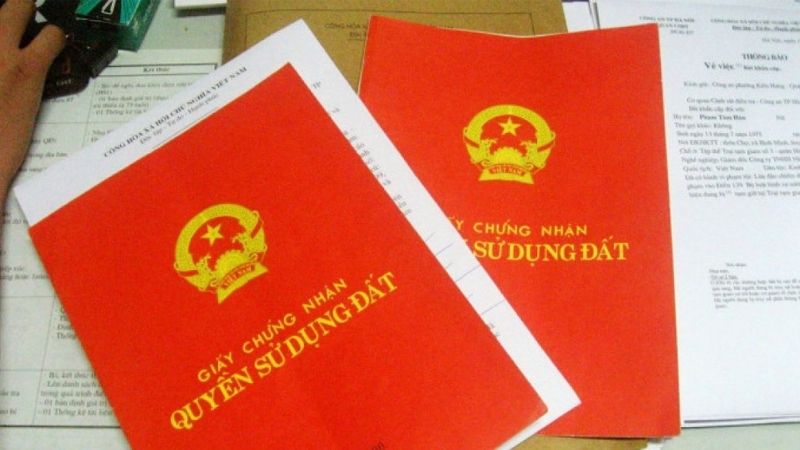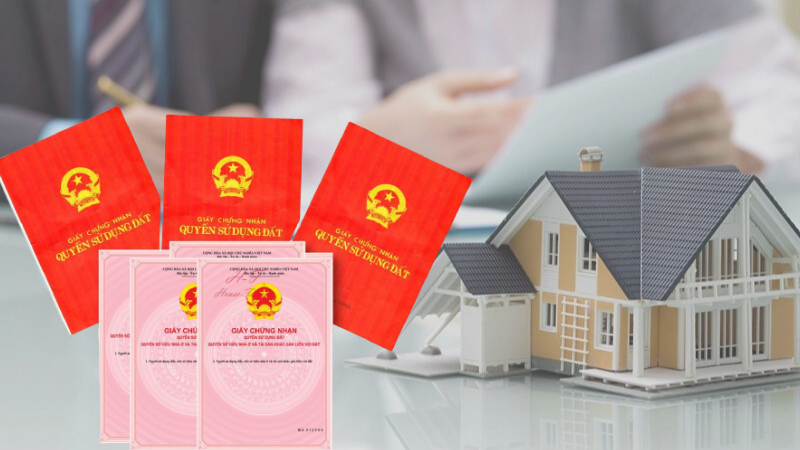Land transfer is a common legal activity for those looking to lease, inherit, convert, or transfer land. So, what are the conditions and procedures for transferring land use rights? Let’s find out in the article below.
1. Conditions for Transfer of Land Use Rights
The conditions for the exercise of the right to transfer land use rights are stipulated in Article 188 of the 2013 Land Law.
“Article 188. Conditions for the exercise of the rights to convert, transfer, lease, sublease, inherit, donate, mortgage land use rights; contribution of land use rights as capital”
“1. Land users shall be entitled to convert, transfer, lease, sublease, inherit, donate, mortgage their land use rights; and contribute their land use rights as capital, provided that they meet the following conditions:
a) Having a Certificate of Land Use Right, except for the cases prescribed in Clause 3, Article 186 and the case of inheritance receipt prescribed in Clause 1, Article 168 of this Law;
b) The land is not subject to any dispute;
c) The land use right is not subject to enforcement by seizure;
d) The land is within the time limit for land use.”
 Conditions for the implementation of land transfer
Conditions for the implementation of land transfer
“2. In addition to the conditions prescribed in Clause 1 of this Article, land users, when exercising their rights to convert, transfer, lease, sublease, inherit, or donate their land use rights; mortgage their land use rights; or contribute their land use rights as capital, must also meet the conditions prescribed in Articles 189, 190, 191, 192, 193, and 194 of this Law.”
“3. The conversion, transfer, lease, sublease, inheritance, donation, mortgage of land use rights, and contribution of land use rights as capital must be registered with the land registration agency and shall take effect from the time of registration in the land register.”
According to the above provisions, the transfer of land use rights must meet the following conditions:
– Have a Certificate of Land Use Right.
– The land is not subject to any dispute.
– The land use right is not subject to enforcement by seizure.
– The land is within the time limit for land use.
Usually, meeting these four conditions is sufficient to allow the transfer. However, in some cases, the transferee must not belong to the cases prohibited from receiving the transfer.
According to Article 191 of the 2013 Land Law, the following cases shall not be entitled to receive the transfer:
– Organizations, households, individuals, community of residents, religious organizations, overseas Vietnamese, and enterprises with foreign investment capital shall not be entitled to receive the transfer or donation of land use rights in cases where the law does not permit the transfer of land use rights.
– Economic organizations shall not be entitled to receive the transfer of land use rights for rice land, protective forests, and special-use forests from households or individuals, except in cases where the purpose of land use is converted according to the approved land use planning and plan.
– Households or individuals not directly engaged in agricultural production shall not be entitled to receive the transfer or donation of land use rights for rice land.
– Households or individuals shall not be entitled to receive the transfer or donation of land use rights for residential land or agricultural land within the protective forest area or the strict protection sub-zone and ecological recovery sub-zone of the special-use forest area if they do not live in such protective forest or special-use forest area.
For reference:
2. Procedure for Transfer of Land Use Rights
The procedure for transferring land use rights is as follows:
Step 1: The transferor and transferee shall go to the notary public organization in the province where the land is located to request notarization of the land use right transfer contract.
– The dossier for requesting notarization (1 set) shall include:
+ Request for notarization of the contract
+ Draft contract (if any)
+ Original ID card (citizen identification card), household registration book of the transferor and transferee
+ Original Land Use Right Certificate
+ Copies of other relevant documents required by law.
 Procedure for Transfer of Land Use Rights
Procedure for Transfer of Land Use Rights
Step 2: Declare finances at the Land Registration Office
The dossier for changing the name in the register shall include:
– Declaration of registration fee
– Declaration of personal income tax
– Notarized land use right transfer contract
– Land Use Right Certificate (red book), 01 certified copy of the right of ownership of houses and assets attached to the land
– 01 certified copy of the transferee’s ID card and household registration book
Step 3: Declare the change of name in the register, the dossier shall include:
– The transferor shall sign a request for registration of changes, or the transferee may sign if both parties agree that the transferee will carry out the administrative procedures.
– Notarized transfer contract.
– Original Land Use Right Certificate and right of ownership of houses and assets attached to the land.
– Original Land Use Right Certificate.
– Copy of the transferee’s household registration book and ID card.
Step 4: According to the law, pay the fees and receive the red book.
The fees for the transfer of land use rights include:
– Personal income tax: 2% of the transfer value;
– Registration fee: 0.5% of the transfer value;
– Fee for issuance of the Certificate of Land Use Right, ownership of houses and other assets attached to the land is divided into two cases:
Case 1: For districts under the central city, wards in the inner city or towns under the province:
– Land with houses: VND 100,000 for the issuance of a new certificate and VND 50,000 for the issuance of a second certificate.
– Land without houses: VND 25,000 for the issuance of a new certificate and VND 20,000 for the issuance of a second certificate.
Case 2: For households and individuals in rural areas, the fee for issuance of the Certificate of Land Use Right, ownership of houses and other assets attached to the land shall be exempt:
In addition, you also have to pay for measurement, mapping, and land-use right certification fees.
Accordingly, the land-use right certification fee is a charge for those who register and submit dossiers for land-use right certification with a need or requirement for certification, to offset the cost of certifying the dossier, and the necessary and sufficient conditions for the competent state agency to allocate or lease land, such as conditions related to land status, planning and plan for land use, and conditions related to livelihood, production, and business.
The land-use right certification fee is only applicable in cases where the competent state agency conducts certification for land allocation or lease and for the transfer of ownership of houses attached to the land use right.
Total amount of fees:
Depending on the area of land granted with land use rights, the complexity of the dossier for land use right grant, the purpose of land use (for housing, production, business), and the specific conditions of each locality, different levels of fees shall be applied accordingly, but the principle is that the fee for land used for housing must be lower than that for land used for production and business, and the highest fee must not exceed VND 7,500,000/dossier.
The above is our sharing about the conditions and procedures for transferring land use rights. Hopefully, you will find it useful and can apply it in practice.
What is a Land Use Right Certificate (the “Red Book”) and a House Ownership Certificate (the “Pink Book”)? Everything You Need to Know About These Certificates in Vietnam.
What are the Red Book and the Pink Book? These are essential documents regarding land and property ownership in Vietnam. Understanding these documents is crucial for anyone looking to buy or sell real estate in the country. Join us as we delve into the world of the Red Book and the Pink Book and uncover everything you need to know about these vital records.



































